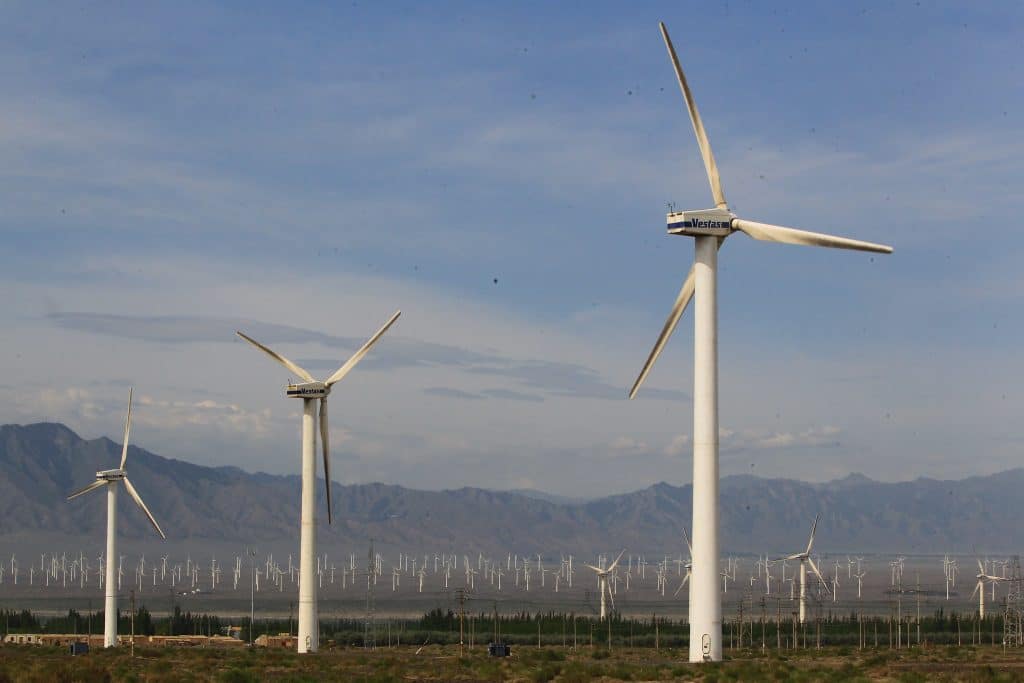The two renewable energy sources accounted for 30% of the EU electricity generation in the first half of 2024, energy think tank Ember said last week.
—
Wind and solar energy made up a record share of the European Union’s (EU) electricity generation in the first half of 2024, overtaking fossil fuels for the first time, a new report has unveiled.
According to energy think tank Ember data published last Tuesday, the two renewable energy sources accounted for 30% of the bloc’s electricity, while planet-warming fossil fuels accounted for 27%, a 17% decrease in the first half of this year compared to the same period in 2023. This is despite a 0.7% rebound in energy demand following two years of downward trends, which Ember said was “more than met” by wind and solar.
In total, wind and solar surpassed fossil fuel generation in 13 of the 27 EU Member States with Germany, Belgium, Hungary, and the Netherlands hitting the milestone for the first time. All low-carbon sources combined, including hydroelectric and nuclear power, surged this year and combined made up 73% of all electricity generation. Contrarily, all planet-warming sources dropped. Coal generation alone fell by 24% compared to the same period last year.
As a result, Ember said the bloc’s emissions so far this year were 31% lower than in the first half of 2022 in what it called “an unprecedented decline over such a short period.” In January, the Centre for Research on Energy and Clean Air’s (CREA) found that carbon dioxide (CO2) emissions in the EU fell 8% last year. This represented a 60-year low and the second-steepest year-to-year decrease after 2020, a year heavily influenced by Covid19 lockdowns and restrictions. The research center found that more than half of the decline was attributable to the rapid expansion of renewable energy sources, particularly wind and solar, as well as a rebound in hydropower and nuclear, owing to the prolonged energy crisis sparked by the war in Ukraine, which forced the bloc to lower its reliance on petrostates such as Russia.
“We are witnessing a historic shift and it is happening rapidly,” said Chris Rosslowe, Senior Energy & Climate Data Analyst at Ember. “If Member States can keep up momentum on wind and solar deployment then freedom from fossil power reliance will truly start to come into view
.”
Warming Planet
The burning of coal, natural gas, and oil for electricity and heat is the single-largest source of global greenhouse gas (GHG) emissions, the primary drivers of global warming by trapping heat in the atmosphere and raising Earth’s surface temperature. Global fossil fuel consumption has more than doubled in the last 50 years as countries around the world have worked to improve their standards of living and economic output. However, scientists have long warned that curbing fossil fuel extraction and consumption is the only way to halt global warming and secure a liveable future.
Coal, the cheapest and dirtiest fossil fuel, is the single-largest source of carbon emissions, responsible for over 0.3C of the 1.2C increase in global average temperatures since the Industrial Revolution. It is also a major contributor to air pollution.
Europe is the world’s fastest-warming continent, having warmed at a rate that is twice as much as any other continent since the 1980s. Here, heat-related mortality has increased by around 30% in the past two decades. Meanwhile, heat-related deaths are estimated to have increased in 94% of the European regions monitored.
Featured image: Asian Development Bank/Flickr.
This story is funded by readers like you
Our non-profit newsroom provides climate coverage free of charge and advertising. Your one-off or monthly donations play a crucial role in supporting our operations, expanding our reach, and maintaining our editorial independence.
About EO | Mission Statement | Impact & Reach | Write for us
How can I contribute to a more sustainable planet?
- 🗳️ Vote for Climate Action: Exercise your democratic rights by supporting candidates and policies that prioritize climate change mitigation and environmental protection. Stay informed with Earth.Org’s election coverage.
- 👣 Reduce Your Carbon Footprint: Make conscious choices to reduce your carbon footprint. Opt for renewable energy sources, conserve energy at home, use public transportation or carpool, and embrace sustainable practices like recycling and composting.
- 💰 Support Environmental Organizations: Join forces with organizations like Earth.Org and its NGO partners, dedicated to educating the public on environmental issues and solutions, supporting conservation efforts, holding those responsible accountable, and advocating for effective environmental solutions. Your support can amplify their efforts and drive positive change.
- 🌱 Embrace Sustainable Habits: Make sustainable choices in your everyday life. Reduce single-use plastics, choose eco-friendly products, prioritize a plant-based diet and reduce meat consumption, and opt for sustainable fashion and transportation. Small changes can have a big impact.
- 💬 Be Vocal, Engage and Educate Others: Spread awareness about the climate crisis and the importance of environmental stewardship. Engage in conversations, share information, and inspire others to take action. Together, we can create a global movement for a sustainable future.
- 🪧 Stand with Climate Activists: Show your support for activists on the frontlines of climate action. Attend peaceful protests, rallies, and marches, or join online campaigns to raise awareness and demand policy changes. By amplifying their voices, you contribute to building a stronger movement for climate justice and a sustainable future.
For more actionable steps, visit our ‘What Can I do?‘ page.














